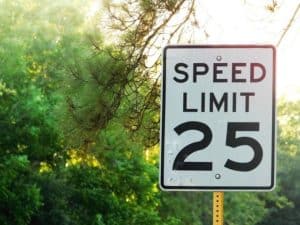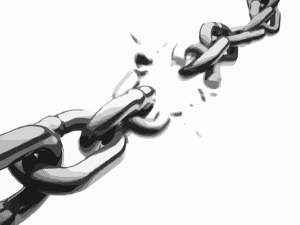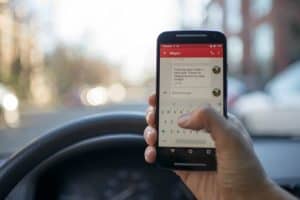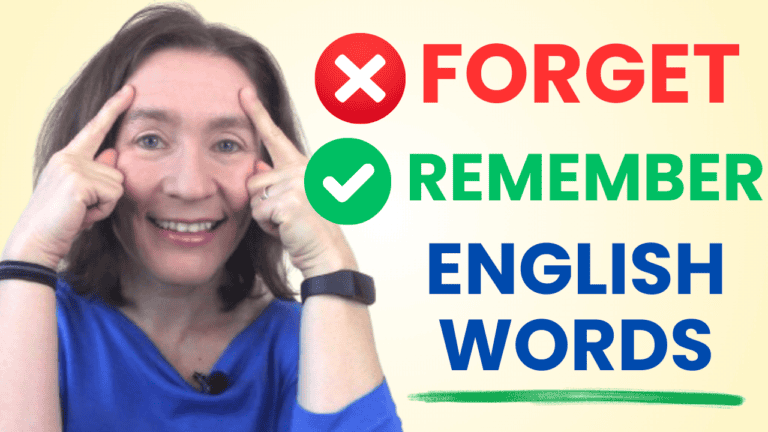
Hi students! It’s day 3 of our mini-course all about words with multiple meanings, and our word today is BREAK. Get ready to learn lots of different ways to use this word in English.
break = damage and separate into pieces
The basic and most common definition is to damage something and separate it into pieces. Yesterday I was washing the dishes and I accidentally dropped a glass, and it broke. If you break your arm or break your leg, it means the bone has separated into pieces – ouch!
You can break something by accident, as in the example of dropping a glass, or you can break it on purpose – if I have a big chocolate bar I want to give to three kids, I would break the chocolate into three pieces.

break = something stops working
We also use break when something stops working, stops being functional, even if it’s not physically in pieces. If your printer keeps showing an error message, and it won’t print, you could say the printer is broken.
break = do something contrary to an agreement/rule
If you break the law, break a promise, break an agreement, or break the rules, it means you do something that is contrary to, against that law, promise, agreement, or rule, or fails to follow the agreement.
If the speed limit is 35 mph and you are driving at 50 mph, you are breaking the law. If you promised your friend you’d help him move to a new apartment, but then you didn’t, you broke your promise because you failed to do what you promised. In soccer, touching the ball with your hands is breaking the rules of the sport (unless you’re the goalkeeper).

break = stop activity for a short time
We also use break to mean “stop for a short time” – for example, in the middle of an all-day meeting, the boss might say “Let’s break for lunch” – let’s stop the meeting briefly for lunch.
It’s probably more common to use the noun form, by saying “Let’s take a break.” We sometimes describe what the stop/pause is for – you can talk about a coffee break, a bathroom break, a smoking/cigarette break, a lunch break. These all describe brief pauses or stops in the middle of an activity, in order to eat, drink, go to the bathroom, or smoke.
break = interrupt (and sometimes stop permanently)
Similarly, break can also mean to interrupt something, and sometimes stop it permanently. If you break a habit, it means you stop doing something you previously did often. If I eat a lot of fast food, I need to break that habit if I want to become healthier.
So remember – “take a break” is a temporary pause, but if you break a habit, hopefully you stop the habit permanently.
Other expressions that use “break” in the sense of “interrupt” are when it’s quiet, but then something breaks the silence. Like if everyone in a meeting is quiet and thinking about how to solve a problem, and then someone says, “I have an idea,” that comment would break the silence, interrupt the silence.
Another expression is to break your train of thought – this is used when you’re thinking deeply about a topic and concentrating hard on it, but then something happens to distract you. If I’m focusing on developing a new lesson, but then my cell phone rings, it would break my train of thought, and if I answer the phone call, I might have a hard time getting back to what I was thinking about.
Finally, if someone is falling, hopefully there is something to break the fall, interrupt the fall before that person hits the ground. When people are training to be in the circus, and doing dangerous acrobatics high in the air, there is a net underneath to break the fall, so if they do fall down, their fall would be interrupted before they hit the ground.

break = weaken, hurt, destroy something not physical
Break can also mean to weaken, hurt, or destroy something – usually something that’s not physical.
If someone breaks your heart, it means they hurt you very badly emotionally. Maybe a boyfriend or girlfriend who you really loved, decided to end the relationship unexpectedly – that would break your heart.
If something breaks your spirit, that’s different – it means it destroys your confidence and self-esteem. Let’s say some parents are always telling their child negative things like “You’re so stupid,” it would break the child’s spirit.
Another example is to break power – sometimes governments make laws to break the power of large corporations, meaning to weaken or destroy the power of those companies.
If something breaks your resolve, it means it weakens/destroys your decision or determination to do something. Let’s say I really want to be a doctor, but then I read an article about how doctors are always really stressed, that might break my resolve (destroy my determination) to become a doctor.

break = reveal news, make something known
When talking about the context of news, break can mean to reveal something to the public. Saying “the scandal broke” means that the scandal was made known publicly.
We also have the expression breaking news, which means the most recent news that is being published very soon after it happened.
In a similar way of break meaning “to make something known,” we have a specific expression break the news to somebody, which means to inform them of bad news. Let’s say I see my neighbor’s dog escape from their house and get hit by a car – I will then have to go break the news to my neighbor that unfortunately their dog is injured or dead.
break = run or escape
Break can also be used to mean running or escaping. To break free from something is to escape it, to manage to get free from it. For example, after many years of counseling, my uncle finally broke free from his addiction to gambling.
We can also talk about a prison break, meaning when prisoners escape from the prison.
And then there’s an expression make a break for it, which means to suddenly run very quickly. If I find a big spider in my bathroom, I’ll make a break for the door! Or if I let go of my daughter’s hand in the supermarket, she’ll make a break for the candy aisle – meaning she’ll run there.

break = beginning
When talking about nature, we have a few different expressions with the word break.
When we say the break of day, the break of dawn, or daybreak, we are talking about the very beginning of the day, when the sun first comes up.
If we say a storm broke, it means the storm begins.
We can also say an ocean wave breaks when it reaches its highest point and then starts to collapse down.
break = separation in relationships
When it comes to relationships, break often means a separation. The phrasal verb break up is used when a romantic relationship ends and the two partners separate. John and his girlfriend broke up last week.
We also have the expression make a clean break, which emphasizes that the separation is complete so that you can start fresh. Maybe you had some bad experiences in your city, and you move to a new place so you can make a clean break with your past – completely separate from it, without continuing to be be involved in anything from your past.

voice breaks = voice changes tone
A few quick and specific expressions to finish up this part of the lesson:
If someone’s voice breaks, it means that it changes tone because of strong emotion. If your friend is talking about a recent tragedy that affected them personally, their voice might break – their speaking would be interrupted or would sound a little different, because of their strong sadness.
We also use this expression in another way – when a boy is around 13 or 14 years old, his voice breaks – it changes to have a deeper tone, so he sounds less like a child and more like a man.
break a large bill = exchange it for smaller bills
If your friend asks “Hey, can you break a 20?” – he is talking about money, and asking if you have smaller bills (like $5 or $10) to exchange for his $20 bill. Maybe he wants to buy a $2 item from a vending machine, and he doesn’t want to put a whole $20 bill in there, so he asks if you have smaller bills to break his $20 bill.
a big break = a sudden opportunity for success
When you hear someone talking about a big break, this is an informal way to talk about a sudden opportunity or quick success, especially when it comes to a career.
Let’s say there’s an actress who has only had minor parts for many years, but she gets a big break when she’s given the leading role in a major movie. This is a sudden great opportunity, and it implies that she will have continued success after it.

Phrasal verbs with BREAK
Let’s turn our focus to phrasal verbs with the word break. I already mentioned break up meaning to end a romantic relationship, and now we’ll learn some more.
If a machine breaks down, it means it stops functioning. We often use this for cars – my car broke down on the highway and I had to get it towed.
We can also say a person breaks down or has a breakdown – this means they have a sudden failure of their health – sometimes physically, but more often mentally/emotionally; they suddenly get very upset or very depressed. A new mom of triplets (that’s 3 babies) might get so stressed by all the responsibility that she has a breakdown – so maybe she stops eating and she gets very anxious.
To break through means to make a quick advance, especially through an obstacle. You’ll often hear this in the noun form when talking about a breakthrough. If scientists are trying to develop some new technology and they make a breakthrough, it means they have suddenly gotten past the challenges, and made great new progress.
We use the phrasal verb break out when a bad skin problem suddenly appears – your face might break out in a rash (red, irritated skin) or pimples (small bumps from clogged pores). It’s also common to talk about fights or violence breaking out when they suddenly appear.
When a robber forcefully enters a house or business, usually in order to steal something this is called breaking in. Or you could say he’s breaking into the building.

Idioms with BREAK
Let’s finish up with a few idioms! The first one is break the bank – this means to be very expensive, almost like it will use up all your money. If you’re shopping for a new refrigerator, you could tell the salesperson, “I’m looking for a fridge that’s reliable, but won’t break the bank” – meaning it won’t cost a ton of money.
To break rank/ranks means to do something differently than other members of a group. If all the teachers in a school use textbooks to teach, and one teacher decides to use games instead, that teacher is breaking rank because they are acting differently from the group. If everyone in my family is an engineer and I decide to become a painter instead, I’m breaking rank. Breaking rank can be a good thing, a bad thing, or a neutral thing.
Finally, a very common expression is to give someone a break. This actually has a few different meanings. One is to be more flexible/understanding and less strict/demanding, or to give someone another chance. If a student failed to turn in an assignment because they had computer problems, the teacher might give him a break and allow him to turn it in late. The teacher is being flexible with the rules and allowing an exception or another chance.
When someone says Gimme a break! as an exclamation, this usually means either “stop annoying me!” or “that’s ridiculous!” or “I don’t believe it!” Let me give you some examples.
If my friend is texting me hundreds of times a day, and expects me to reply instantly all the time, I might tell her, “Gimme a break!” to mean “Stop bothering me with all these texts!”

Let’s say in my job I normally work with 10 clients per month, and now my boss wants me to take 20 clients per month. I might complain to my husband, “He’s doubling my workload. Gimme a break!” to mean “that’s ridiculous!”
Imagine my teenage son always sleeps in until noon on the weekends. He then tells me he’s planning on waking up at 6am to exercise. I might say, “You’ll wake up that early? Gimme a break!” to mean “I don’t believe it!”
Whew – those were a lot of definitions and expressions, and it’s time for me to take a break. I suggest you take a break, too – get some water, get some coffee – and then come back and try the practice exercise so that you can review what you learned today. Bye for now!










